The M&G's Lauren Clifford-Holmes reflects on her trip to Chad where she visited refugee camps filled with families trying to escape Boko Haram.
I traveled to Baga Sola in Chad last week with Unicef to cover the Nigerian refugee situation around Lake Chad.
For the first time, I walked through a refugee camp, visiting those living in the white plastic UNHCR tents, as families try to continue with life while in total limbo – their homes, livelihoods and belongings left far behind. I met children who felt hunted, travelling from town to town to escape Boko Haram, finally making it across Lake Chad to safety only to have the Islamist extremist group follow them there. Torching houses, killing indiscriminately, stealing livestock, sending families running into the bush in the night, fear ringing out around them.
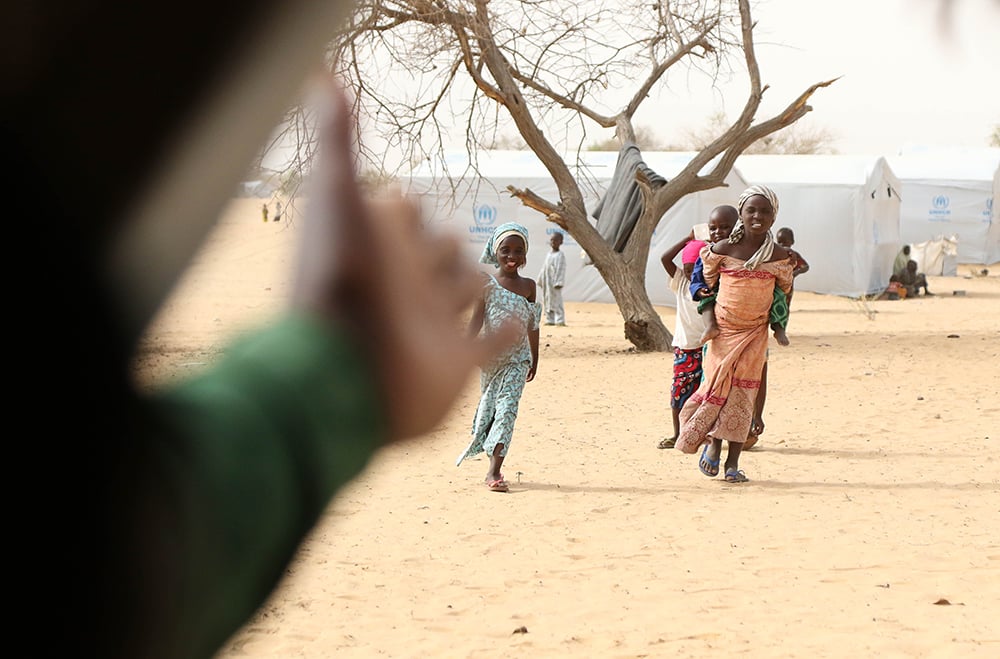 Children make their way back to the tents at the Unicef refugee camp.
Children make their way back to the tents at the Unicef refugee camp.
Following heavy clashes with Boko Haram in Baga, Doro and surrounding areas in northeast Nigeria this year, thousands have sought refuge in neighbouring Chad, adding to the tens of thousands already displaced and living in a state of uncertainty in Cameroon and Niger.
I had a meeting with Unicef last year and asked if it would be possible for me to travel with them into Africa and produce content for the Mail & Guardian. The reality is that few African publications can afford the costs of getting into remote areas around Africa and our stories are largely told by the American and European publications and wire services. Unicef staff acknowledged this trend as problematic and invited me on their Chad trip.
I travelled with Suzanne Beukes from Unicef and Kristin Palitza from Deutsche Presse-Agentur. Both are experienced Africa travellers, having covered everything from fraught elections to Ebola and humanitarian crises. Once in Chad, an Associated Press journalist and photographer, an editor from Politiken in Copenhagen and an Africa correspondent for Neue Zürcher Zeitung in Switzerland joined us.
We were in transit for three days from when I left Johannesburg to when I arrived in Baga Sola. From Jo’burg, we flew to Addis Ababa, spending a night there, before flying to the Chadian capital of N’djamena. Here we spent another night. The heat hit me as I left the airport and climbed into the standard-issue vehicles of nongovernmental organisations in Africa: white Toyota Land Cruisers. These were emblazoned with Unicef’s instantly recognisable blue and white logo on the sides.
We spent an afternoon organising documentation, being briefed by Unicef and getting supplies for our time in Baga Sola. We visited the supermarket, with less selection than even your most basic of Shoprites at home. We left with cardboard boxes full of French-labeled tinned and dry food. On the street we bought fruit and vegetables at informal stands.
Early the following morning the convoy embarked a 10-hour drive more insane than I could have imagined. For two hours outside of N’djamena we traveled on a potholed road. Then the road reached an abrupt end and a whole other kind of journey began; one where we careened through the sand, bodies jumping in seats as we hit inclines and dongas at anything from 50km to 90km per hour. The driver worked the steering wheel left and right, as the vehicle slid in the sand, never getting stuck. The fruit we bought for Baga Sola seemed destined to end up as a fruit salad. I nurse the avocados in the back seat.
 Herds of camels belonging to the tribes lined the sides of the road on the way to Baga Sola.
Herds of camels belonging to the tribes lined the sides of the road on the way to Baga Sola.
We passed kilometres and kilometres of desert landscape – Marie biscuit-coloured sand and small green shrubs. I watched out the window as we passed nomadic tribes and their temporary straw tents and valuable herds of camels. Past stacks of bricks and skinny horses, heads hanging as turbaned tribesmen load their carts. Past small villages – mud houses, litter, tables offering fruit and veg, fresh French loaves and sweets. Women and children see-sawing a water pump, an over-loaded broken down truck, engine open and splayed like a wound.
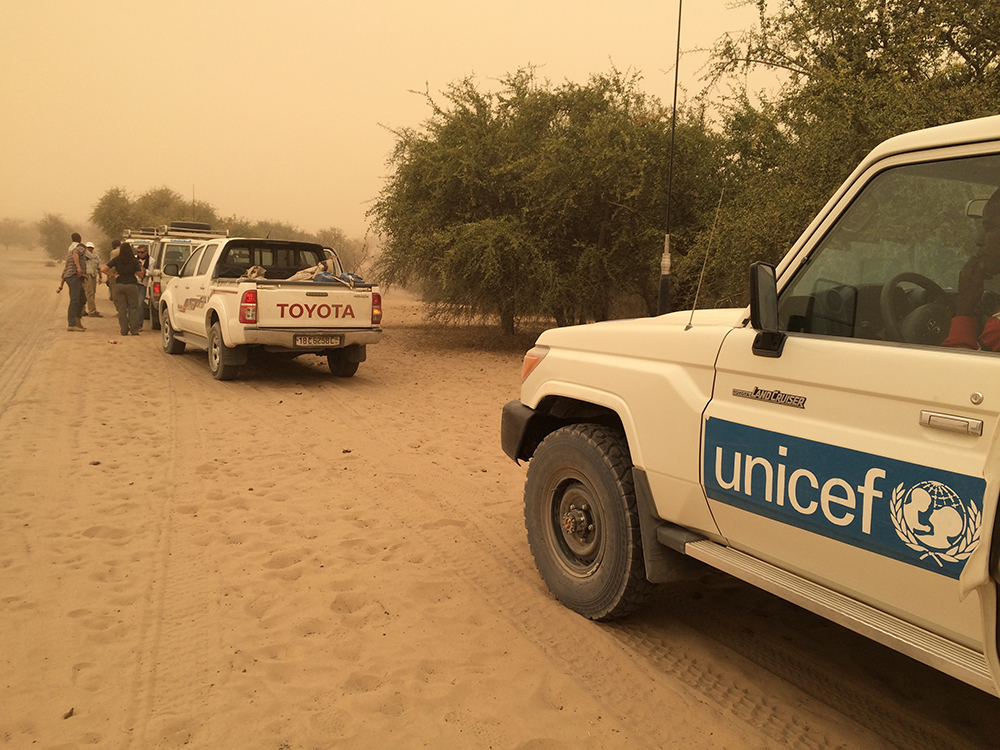
The weather was strange – a warm wind was blowing, masking the sun and the blue sky in a pale brown light. The sun appeared as a silver disk; moon-like.
The distances between the times we saw life – human or animal– became longer. The stretches of desert and shrubs were only punctuated by thorn bush-fenced homes. It looked like no one lives there. But perhaps they were just avoiding the strange weather.
A young child appears, herding a few goats, a caravan of camels trundles along, we pass a small village where a toddler runs out into the road. I guess he hasn’t seen many cars before. The women we pass are bright reminders that colour is still in this brown and dull green world – blood reds, royal purples and emerald greens. We leave behind us long trails of dust.
After eight hours of this we stop at the Governor General’s compound outside the village of Bol. He isn’t available and a deputy gives his stamp of approval on forms already signed by the minister of communications in N’djamena. We are now covered to report and film in the region.
We’ve become weary travellers, sea sick from the incessant jack-in-the-box movements of the vehicles. Another two hours and we arrive in Baga Sola, passing the occasional Chadian soldier in camo, headscarves and glasses. Security in the area has been increased since Boko Haram breached Chad’s borders.
We arrive at the Unicef camp at around 6pm. It is a very basic setup: a rudimentary kitchen, a long drop toilet, an outside shower room with a teapot to scoop and pour the water over our bodies. It’s bliss after the drive. Mattresses lined up on the floor, each with a mosquito net strung up over it.
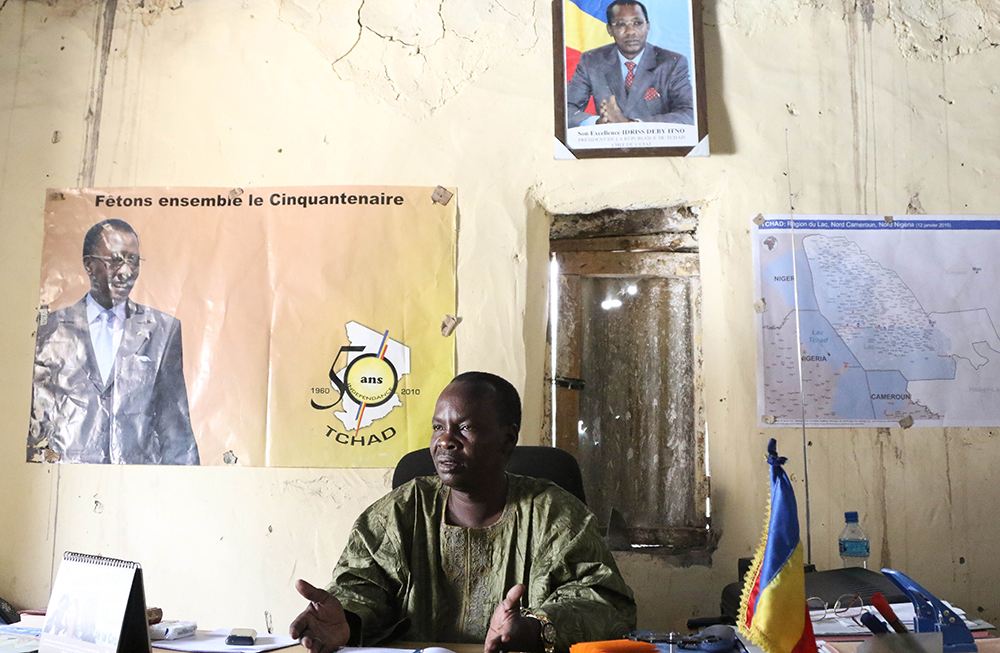 Sous Prefet is in charge of security in the Baga Sola area.
Sous Prefet is in charge of security in the Baga Sola area.
The next morning we glug down black coffee and biscuits and head off in our convoy to the Sous Prefet’s office. He is the local authority of Baga Sola, responsible for security in the area. He informed us (the official version) of what happened in the Ngouboua attacks, all in French – translations relayed by one of the most interesting and endearing characters I’ve ever met – Luc, our head of security for Unicef in this region. He’s an ex-Belgian special forces commander who has worked in Africa for decades
When I finally reached the refugee camp I met my designated translator Hooseini. And now I realise the second huge challenge: language and getting reliable translations. Most refugees speak the northern Nigerian language Hausa. Hooseini isn’t a professional translator and his English isn’t the best. The to-and-fro as I seek clarification begins. The sun is blinding and the heat bakes down on the tents and big tracts of sand between. My first interview is with a woman who fled Doro and got separated from her husband. She cries, hands over her eyes.
Then I meet Habiba, a nine-year-old girl who got separated from her family as she fled. She’s a key part of one of my stories I’m doing. I realised that in the terror and darkness, families flee in different directions and in the chaos wives are separated from husbands, children from parents. I try to imagine the fear especially the children must feel.
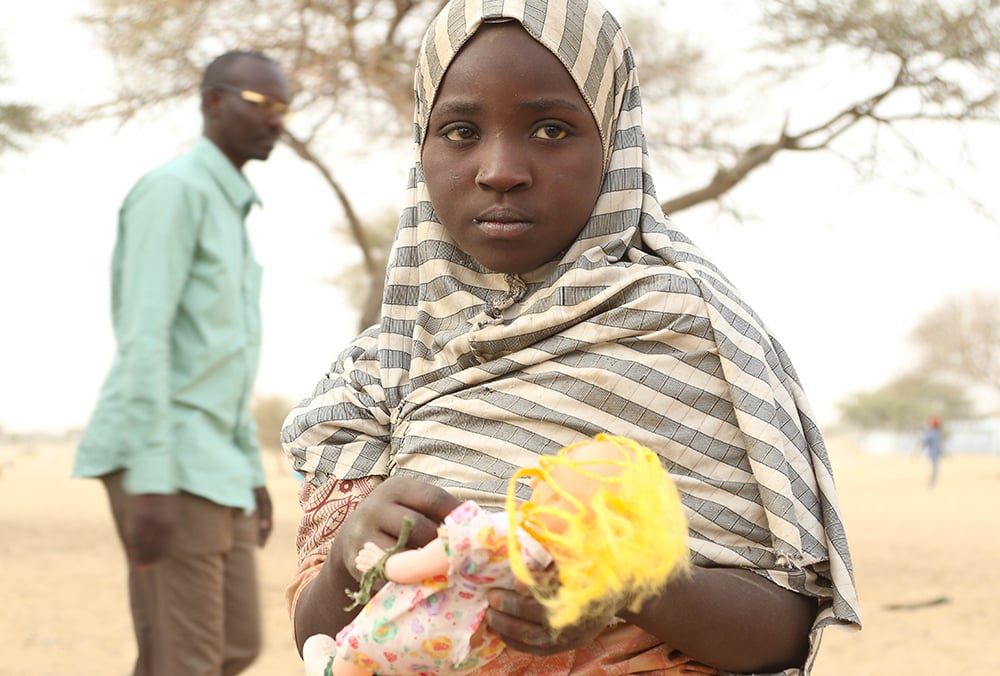 Habiba (9) was split from her family when she fled from Boko Haram.
Habiba (9) was split from her family when she fled from Boko Haram.
The following day we travel two hours to Ngouboua to see the scars Boko Haram have left on the town after attacking there. A Chadian military vehicle with four soldiers, rifles slung over their shoulders, accompanies us. Boko Haram’s presence in the area was recent and the military would not let us travel alone. I photograph burnt houses, blackened clothes melted together in the hot sand, cooking pots strewn in the decimated remains.
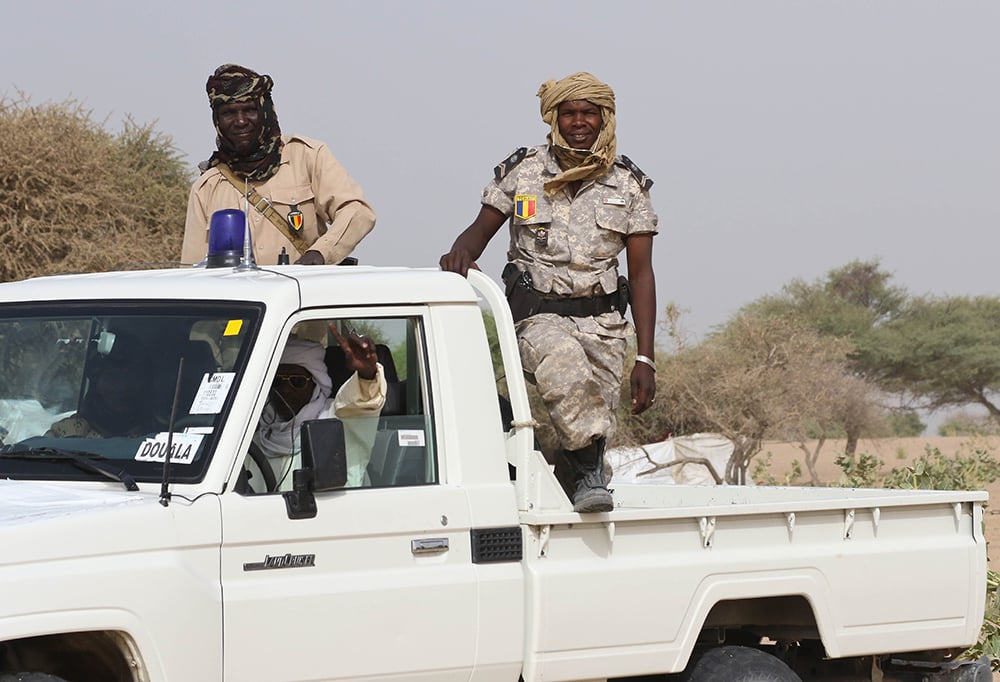 A military escort accompanies the crew to Ngouboua.
A military escort accompanies the crew to Ngouboua.
We learn from the head of police in the area that there had been another attack in the area the night before. We want to go but can’t get the authorisation. I come to realise here that getting reliable, honest information from officials in these areas is incredibly difficult. He tells us they killed 30 Boko Haram and there were no civilian casualties. I guess it’s possible but how do you know if you can’t get there yourself?
 A panoramic view of the effects in Ngouboua.
A panoramic view of the effects in Ngouboua.
On our third and final day I headed back to the camp to get early morning shots. I captured children being bathed by their mothers, people cooking, children on their way to the Unicef school in the camp. I brought Hooseini back to the Unicef compound to go through translations. I had a moment of panic when I realised how much was getting mixed up and needed clarifying. He ended up staying the night with us so we could work late – I had to get it right.
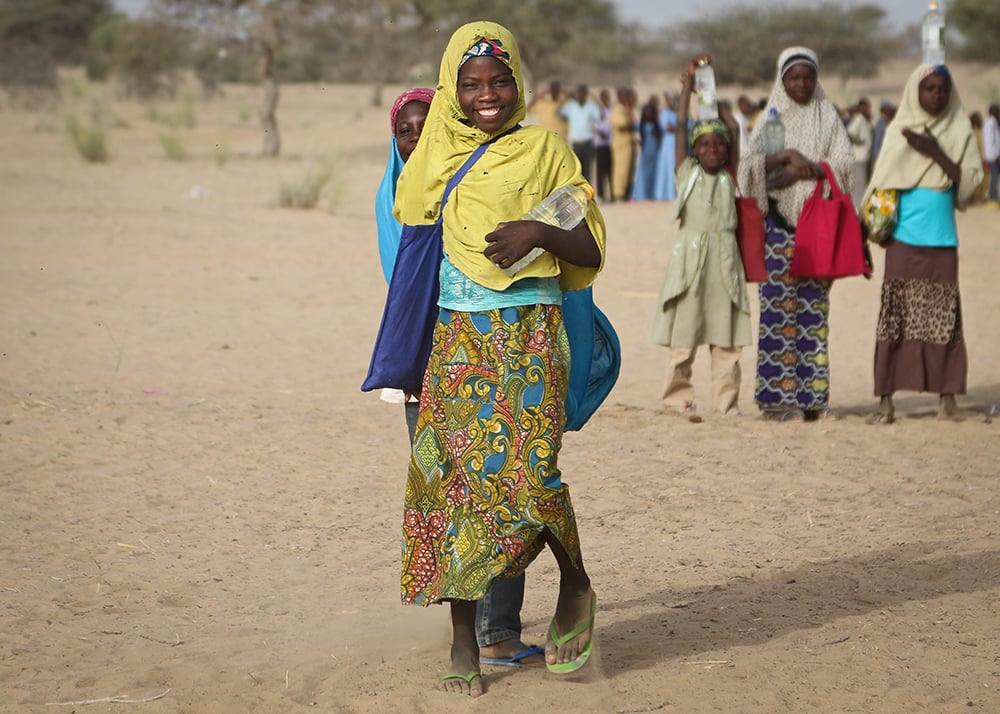 Children make their way to the Unicef school in the camp.
Children make their way to the Unicef school in the camp.
The Nigerian elections are around the corner and those with a close eye on developments say there will be bloodshed. Life in this part of our continent is not about to get any easier. We need to pay attention to what fellow Africans are going through, South Africa needs to hear their stories.